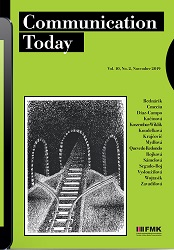FROM A REDUCTIONIST TO A HOLISTIC MODEL OF DIGITAL COMPETENCE AND MEDIA EDUCATION
FROM A REDUCTIONIST TO A HOLISTIC MODEL OF DIGITAL COMPETENCE AND MEDIA EDUCATION
Author(s): Viera KačinováSubject(s): Social Sciences, Media studies, Communication studies, Sociology
Published by: Univerzita sv. Cyrila a Metoda v Trnave, Fakulta masmediálnej komunikácie
Keywords: DIGCOMP 2.0 – The Digital Competence Framework for Citizens; digital competence; holistic model; media education; media literacy movement; reductionist model;
Summary/Abstract: The fact that digital competence is a key competence in the 21st century, which increases the educational level of an individual (in the lifelong learning process) and the chances for their professional growth and personal satisfaction within the context of diverse life realities of the ‘networked’ society, is currently undebated among experts. However, the qualities to be included as a result of reflecting the current trends of ubiquitous and all-embracing digitalisation and its associated changes in (not only) the educational needs of an individual are more widely discussed in a professional context and within a number of relevant European guidelines. The objective of this study is to contribute to the discussion in the context of the questionable reductionist conceptof digital competence, preferring its technological and instrumental dimension, while ignoring enhancement of other key qualities, such as critical thinking, socio-affective qualities and persistent positive value habits of personality interacting with digital media. Especially with this intention, it tests the key tool to improve citizens’ digital competence – DIGCOMP 2.0 – The Digital Competence Framework for Citizens. At the same time, it penetrates the process of media education, especially the five fundamental values, which include the new values of the media literacy movement (proposed by J. M. Pérez Tornero a T. Varis) as an integral part of the reflection and description of changes in its paradigm. The study outlines conditions for understanding the digital competence model, which, in the context of the generally perceived educational process should be holistic. Its support in implementation is particularly within formal education.
Journal: Communication Today
- Issue Year: 10/2019
- Issue No: 2
- Page Range: 16-27
- Page Count: 12
- Language: English

